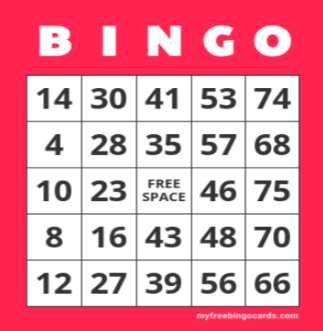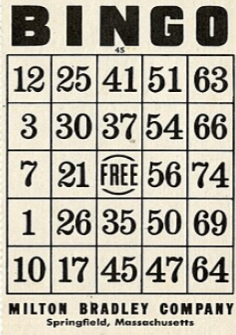Yes, bingo numbers are random, often drawn by RNGs in digital games.
Understanding Bingo Number Generation
Bingo, a game of chance and luck, hinges on the randomness of number generation. This process varies significantly between traditional physical bingo settings and modern online platforms.

How Bingo Machines Work
In physical bingo halls, mechanical or electronic devices draw the numbers. Traditional mechanical draw machines use a set of numbered balls, typically ranging from 1 to 75 or 1 to 90, depending on the bingo variant. An air blower mixes the balls, and the caller announces the randomly ejected ball to the players.
Key Specifications:
- Air Blower Power: Ranges usually from 50 to 200 watts, ensuring effective mixing.
- Ball Material: Often high-grade plastic for durability.
- Machine Size: Varies, with some models being compact (around 40x40x40 cm) for ease of use and others larger for visibility.
- Cost: Prices can range from $100 for basic models to over $1000 for advanced machines with integrated display systems.
The Role of Random Number Generators (RNGs) in Online Bingo
Online bingo utilizes Random Number Generators (RNGs) to ensure fairness and unpredictability. These RNGs are sophisticated algorithms that produce a sequence of numbers that players cannot predict.
Efficiency and Fairness:
- Speed: RNGs can generate thousands of numbers per second, ensuring immediate drawing with no delays.
- Testing: Third-party organizations regularly test RNGs to certify their randomness and impartiality.
- Efficiency: Digital RNGs do not require physical space or maintenance, reducing operational costs.
Link to Random Number Generation on Wikipedia: Random Number Generation
Each method, whether mechanical or digital, has distinct characteristics regarding cost, efficiency, and size, crucial for operators when choosing the right system for their bingo game. In terms of longevity, mechanical systems may need more maintenance compared to digital RNGs, which are generally robust and less prone to physical wear and tear. The transparency and reliability of number generation, whether through physical machines or RNGs, remain critical in ensuring the game’s integrity and player trust.
Assessing Randomness in Bingo
Evaluating the randomness in bingo is crucial for ensuring fairness and trust in the game. This assessment typically involves statistical tests and understanding common myths around number patterns.
Statistical Tests for Randomness
Statisticians use various tests to assess the randomness in number sequences, like those generated in bingo games. One widely used method is the Chi-Squared Test, which compares the expected frequency of number appearances against the observed frequency. If numbers in a bingo game are truly random, each number should have an equal chance of being drawn over a large number of games.
Key Aspects:
- Test Implementation: Involves observing a large number of bingo games and recording the frequency of each number.
- Interpreting Results: A significant deviation from the expected frequency can indicate a lack of randomness.
- Time Factor: The analysis requires a substantial number of games for accuracy, often running over several months to ensure a reliable dataset.
For further details on statistical methods, see Statistical Hypothesis Testing on Wikipedia.
Common Myths and Misconceptions About Number Patterns in Bingo
Many players believe in certain myths and misconceptions about number patterns in bingo. For instance, some think that certain numbers are ‘lucky’ or that numbers can be ‘due’ to appear. However, in a game with properly implemented randomness, these beliefs hold no mathematical basis.

Reality Check:
- “Hot” or “Cold” Numbers: Numbers that have appeared frequently or infrequently in recent games are not predictive of future games.
- Pattern Tracking: Looking for patterns in past games is ineffective due to each draw being independent in a truly random game.
- Psychological Factors: Such misconceptions often stem from the gambler’s fallacy, the false belief that past events can influence future random events.
Understanding the nature of randomness and the probability involved in bingo helps dispel these myths, maintaining the integrity and enjoyment of the game. Players and organizers alike benefit from a clear understanding of these concepts, ensuring that the game remains a fair and unpredictable form of entertainment.
Impact of Non-Randomness in Bingo Games
Non-randomness in bingo can significantly affect both the fairness of the game and the strategies employed by players. It can lead to predictable and manipulable outcomes, which are contrary to the principles of fair play.
Effects on Game Fairness and Player Strategy
When bingo games lack randomness, it can skew the odds in favor of certain players or organizers. If players begin to suspect or detect a lack of randomness, this can lead to a loss of trust and diminished enjoyment of the game.
Consequences:
- Trust Issues: Perceived or real instances of non-randomness can result in players losing trust in the game’s fairness.
- Altered Player Behavior: Players might start to use strategies based on perceived patterns or biases, which defeats the purpose of bingo being a game of luck.
- Decreased Participation: Players discouraged by unfair play may choose to avoid participating in future games, impacting the bingo community and business.
Case Studies: Instances of Rigged Bingo Games
Historical cases of rigged bingo games provide clear examples of the consequences when fairness gets compromised. For instance, in a notable case, an unscrupulous caller might collaborate with a player, using subtle signals to indicate when a ‘winning’ card is in play, skewing the winnings unfairly.
Detailed Analysis:
- Method of Rigging: Involves manipulating the draw process or colluding with insiders.
- Financial Ramifications: Organizers of rigged games can face legal action, hefty fines, and a damaged reputation.
- Player Impact: Those playing rigged games unknowingly may incur financial losses, and the disillusionment can extend to the wider player community.
These instances highlight the critical need for ensuring randomness in bingo games. Both the integrity of the game and the satisfaction of the players heavily rely on the unpredictability and fairness of the outcome. Rigged games not only impact individual perceptions but can also have long-term repercussions for the popularity and viability of bingo as a form of entertainment and gaming.
Regulations and Standards for Bingo Randomness
The integrity of bingo as a game hinges significantly on its randomness. To ensure this, various regulations and standards exist, enforced by governing bodies across both physical bingo halls and online platforms.
Governing Bodies and Compliance Tests
Different countries and regions have specific governing bodies responsible for overseeing gambling activities, including bingo. These organizations, like the UK Gambling Commission or the Nevada Gaming Control Board, set and enforce standards to ensure games are fair and random.
Key Functions:
- Setting Standards: These bodies establish guidelines for the operation of bingo games, specifying how organizers must ensure randomness.
- Regular Audits: Bingo operators often undergo routine audits and testing to verify their compliance with these standards.
- Certification: Compliance with these standards typically results in a certification or license to operate, reassuring players of the game’s integrity.
To learn more about gambling regulations, visit Gambling Commission on Wikipedia.

Ensuring Fair Play in Bingo Halls and Online Platforms
Ensuring fair play involves several proactive steps and checks by both bingo hall operators and online bingo site managers.
Physical Bingo Halls:
- Regular Machine Checks: Operators check and maintain their bingo machines regularly, ensuring they function correctly and numbers are drawn randomly.
- Player Monitoring: Monitoring player behavior and patterns can help identify potential collusions or irregularities.
Online Bingo:
- Random Number Generator (RNG) Use: Online platforms rely on certified RNG software to ensure each number drawn is completely random.
- Software Audits: Independent third-party companies regularly audit the software used by online bingo sites, verifying the RNG’s effectiveness and compliance.
- Security Measures: Advanced encryption and security protocols protect the game’s integrity and the players’ personal information.
Both in physical and online settings, these measures are essential for maintaining a fair, trustworthy gaming environment. They ensure that players have equal chances of winning, preserving the fundamental nature of bingo as a game of chance. Continual adherence to these standards is crucial for the long-term sustainability and popularity of bingo games globally.
Advances and Innovations in Bingo Technology
The world of bingo has seen remarkable technological advancements, significantly enhancing the gaming experience and maintaining the integrity of its random number generation. From the incorporation of sophisticated software to the potential application of AI and machine learning, these innovations are setting a new trajectory for the future of bingo.
Latest Developments in Random Number Generation for Bingo
Modern bingo games, particularly online platforms, now employ advanced random number generators (RNGs) to ensure the unpredictability and fairness of number selection.
Innovations in RNG Technology:
- Quantum RNGs: Some developers are exploring the use of quantum computing to generate numbers in a way that is theoretically impossible to predict or replicate.
- Enhanced Algorithms: Continuous improvements in algorithmic complexity enhance security against tampering and prediction.
These technological improvements not only ensure compliance with strict regulatory standards but also enhance player trust in digital bingo platforms.
For more insights into RNG technology, visit Random Number Generation on Wikipedia.
The Future of Bingo: AI and Machine Learning in Game Design
The integration of Artificial Intelligence (AI) and machine learning is beginning to transform how bingo games are designed and played.
Potential Applications:
- Player Experience Customization: AI can analyze player behavior to customize game difficulty, prizes, and even game aesthetics, enhancing engagement.
- Cheat Detection: Machine learning algorithms can detect unusual patterns that might indicate cheating or game manipulation.
- Predictive Analysis: By analyzing large datasets, AI can help operators understand player trends, optimize game scheduling, and manage prizes to maximize player satisfaction and profitability.
The application of these technologies in bingo is not just about enhancing the gameplay. It’s also about leveraging data to create more engaging, personalized, and fair gaming experiences. As AI and machine learning continue to evolve, we can expect them to play an increasingly significant role in shaping the future of online gaming and bingo.

